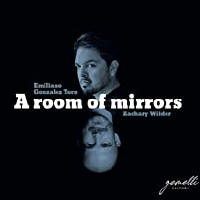Texte paru dans: / Appeared in: |
|
 |
Outil de traduction |
|
The mirror – glass of truth or deception, revealing a twin-self or a dark double – is the intriguing theme behind the irresistible first album on Swiss tenor Emiliano Gonzalez Toro’s new label, Gemelli Factory. ‘A Room of Mirrors’ brings Toro and his own Ensemble I Gemelli together with fellow tenor Zachary Wilder for a two-for-the-price-of-one adventure that’s more Shakespearean comedy than ‘Der Doppelgänger’-style philosophising. The two tenors are the twins in a musical drama that delights in surprises and sudden shifts of tone, now serving up knockabout musical farce (pitch bends and droops along with youthful desire in Marini’s vision of an old woman in love, La vecchia innamorata), now locked in a lyrical embrace (Fransesco Turini’s sensual Dove ten’vai), now fierce rivals in a frenzied duel of semiquavers (Folgori Giove, Galeazzo Sabbatini). But these musical twins are far from identical. Wilder’s delicate, boyish instrument darts and floats, nimble and bright, while Gonzalez Toro’s smokier tone supplies the breadth and warmth – the horn to Wilder’s oboe. At times, though, as they weave in and out of one another it’s hard to tell them apart: a sonic trompe l’œil that plays games with our ears. And then there’s the band, I Gemelli, whose contributions might be wordless but whose meaning is always precise: now mocking and sardonic in a riotous dance, now all understated intimacy in a lute song. It’s an army of generals, but even in this company Rodrigo Calveyra, moving between recorder and cornetto, stands out for his dizzying virtuosity. It’s hard to ignore Monteverdi’s shadow in this musical hall of mirrors – often glimpsed just out of the corner of your eye in style or text. The opening Damigella tutta bella, for example, belongs not to him but to Vincenzo Calestani (and what a zinger it is, with its giddy triple-time rhythms and playful instrumental solos), while there’s more than an echo of Zefiro torna to Annibale Gregori’s lively ciaccona Mai non disciolgasi. Doubles and echoes take many forms, imitative homage not least among them. This affectionate musical tribute – to mutual talent, to musical forebears and to lovers forever twinned in shared emotion – celebrates them all. What a delight. |
|
_small.jpg)



